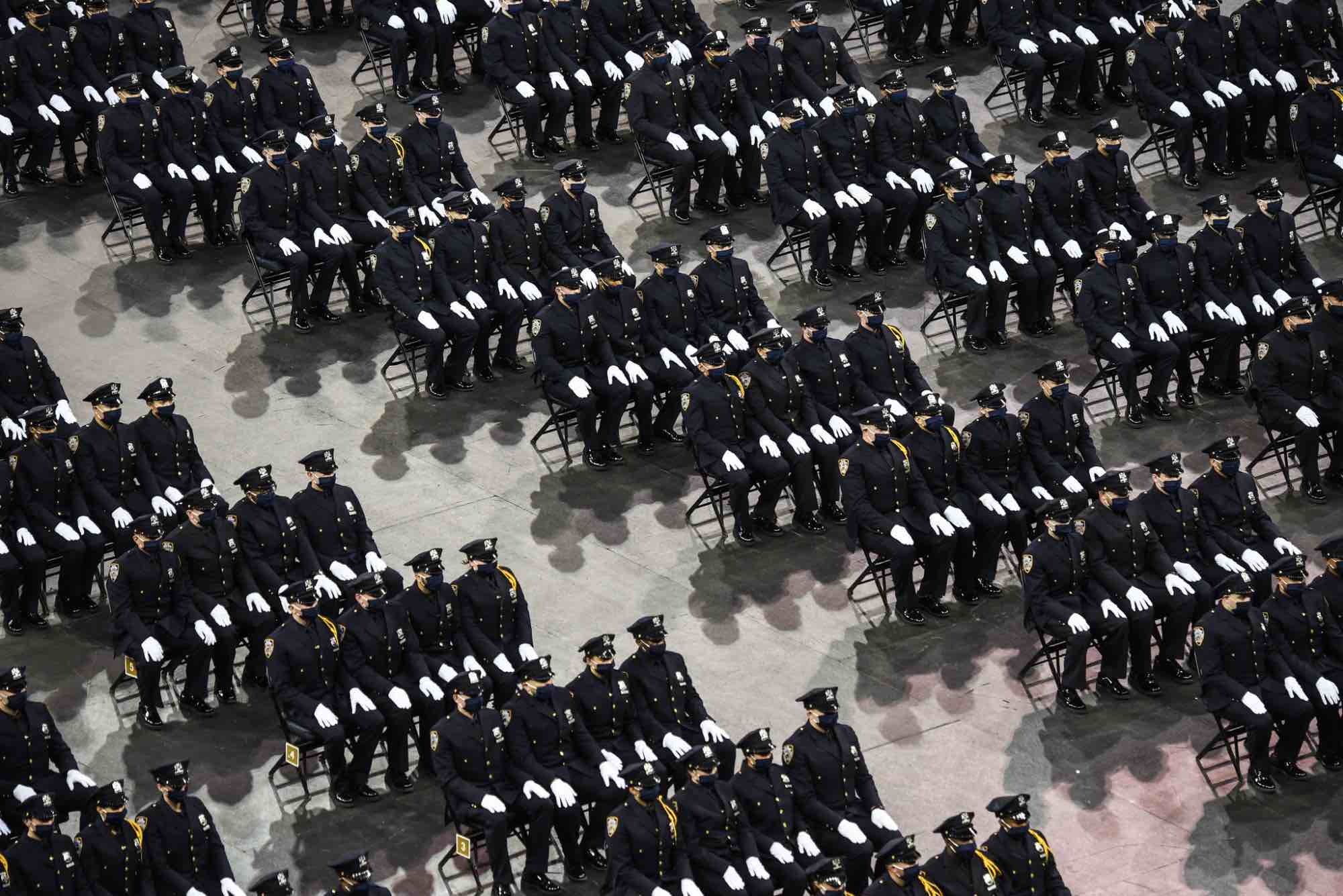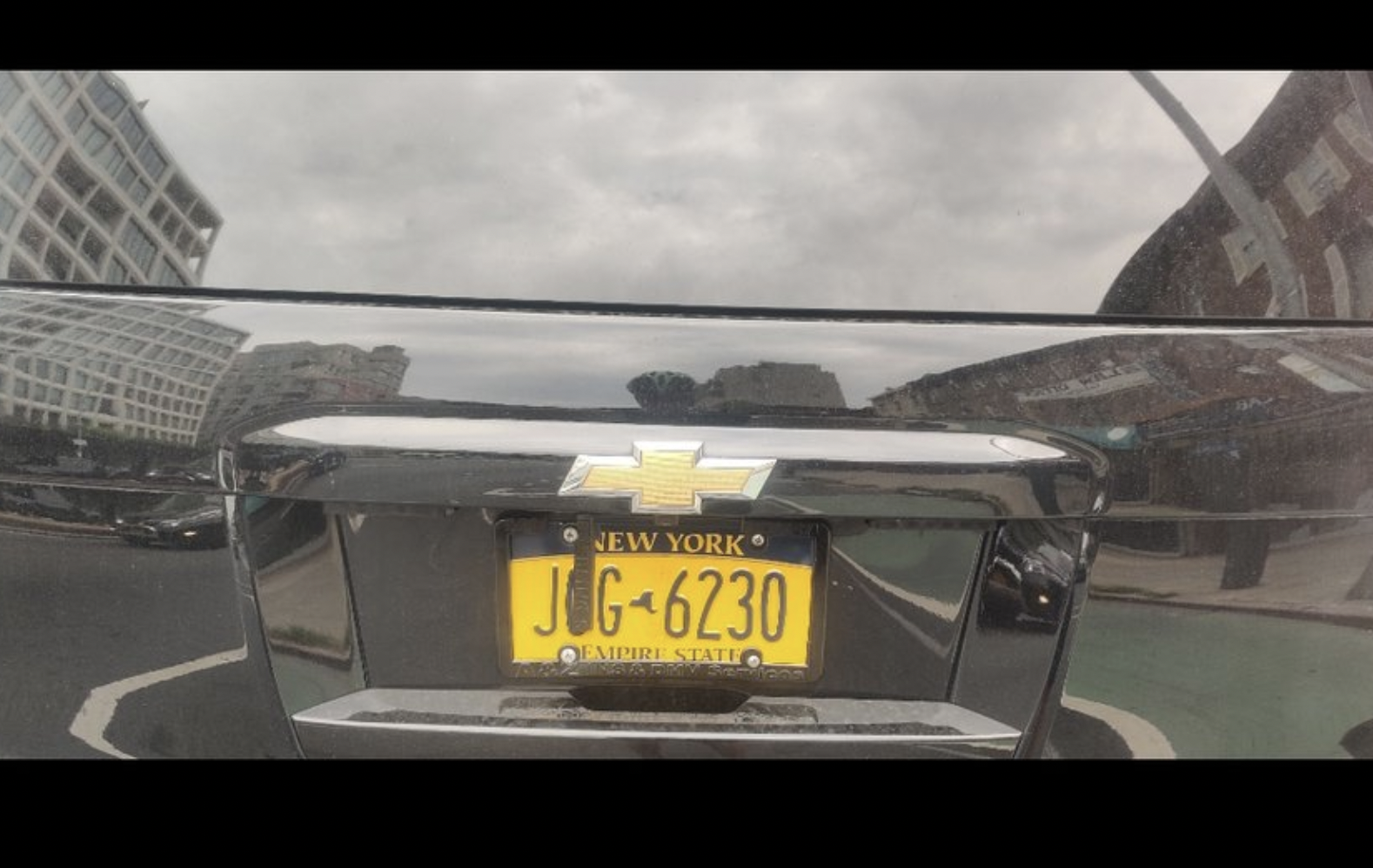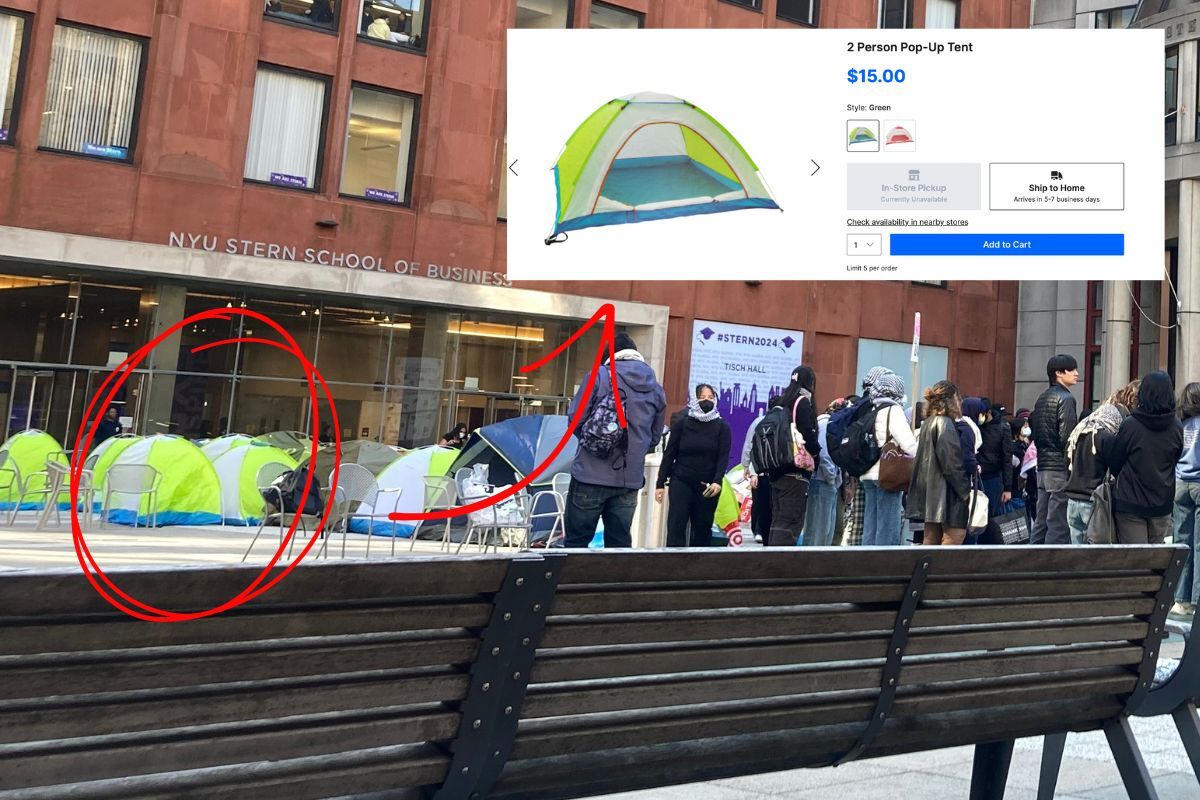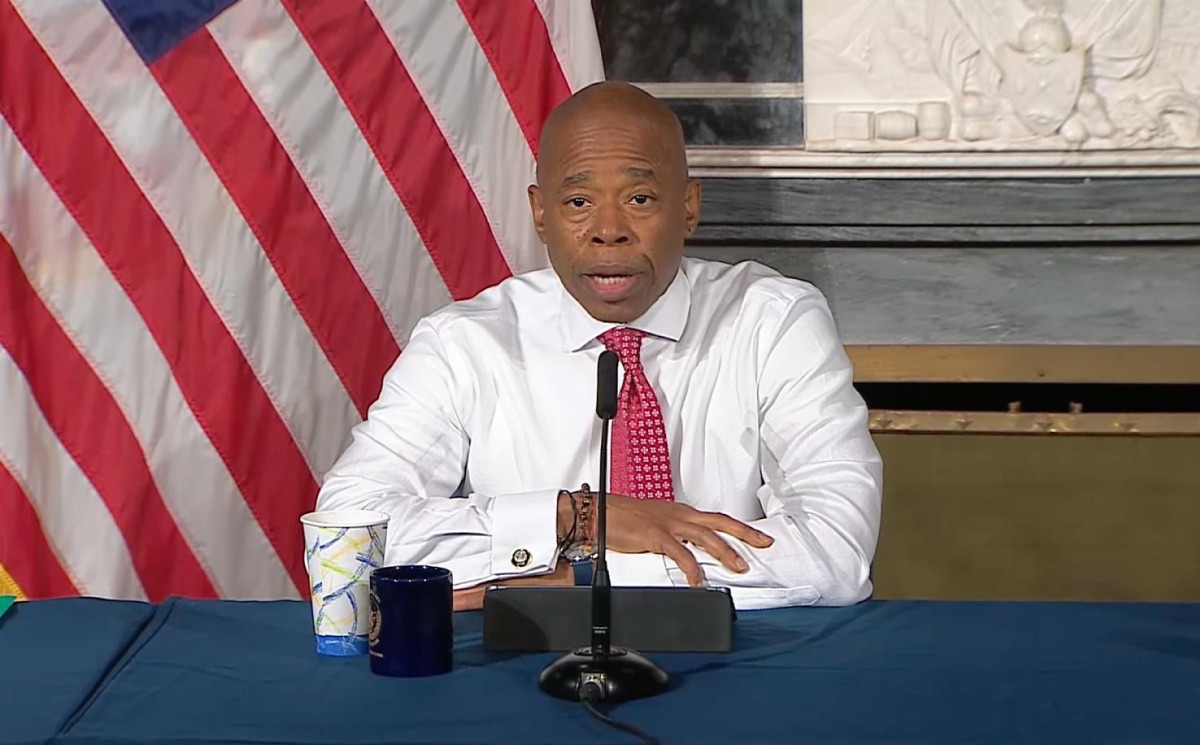Adams Administration Says Police Misconduct Shouldn’t Be Such a Big Deal
9:52 AM EST on January 31, 2023

NYPD graduation ceremony, May 6, 2021 (Michael Appleton/Mayoral Photography Office)
How are New Yorkers served by cutting the cops more slack? On Saturday, Queens Borough President Donovan Richards sent a letter to Police Commissioner Keechant Sewell expressing concerns about "emboldening officers with an existing penchant to not follow proper procedure” and the erosion of "public confidence in the NYPD." The cause for alarm, Richards wrote, was an internal memo from the commissioner that was first made public in December. In it, the top cop announced plans to alter the NYPD disciplinary matrix, a set of standard penalty recommendations for police misconduct, in order to guarantee what she referred to as "fairness" to officers who made "good faith errors and small mistakes."
Sewell, appointed by Mayor Eric Adams, hasn't let her plans for new rules stop her from watering down the current ones, and she has let cops off the hook at a faster clip than her predecessor, Dermot Shea. During her first year as commissioner, Sewell reduced or dropped Civilian Complaint Review Board-recommended penalties for cops "at least" 70 times, while Shea did so a total of 84 times during his 25-month tenure.
According to the most recent monthly report from the CCRB’s Interim Chair Arva Rice, the rate of NYPD-CCRB disciplinary concurrence—which measures how often the NYPD adopted CCRB’s the disciplinary recommendation—decreased from 69 percent in 2020 to 62 percent in 2021, then dropped down to 36 percent as of November 2022.
To be fair to the cops who want to alter it, there are Chick-fil-A locations in New York City older than the NYPD disciplinary matrix. In 2018, an independent panel convened by the NYPD recommended the creation of specific, "if A, then B" guidelines for dealing with police misconduct. In June 2020, Richards, then a City Council member, led the charge to codify such guidelines into city law. Once Richards’s bill succeeded, the NYPD began work with the city’s police oversight agency, the CCRB, on developing those standards of discipline.
The major caveat: The “presumptive penalties” attached to the disciplinary matrix, like any other finding from the CCRB, are non-binding. The power (one could also call it "discretion") to punish or spare delinquent cops remains with the police commissioner and the department’s own investigative forces. The resulting guidelines have been controversial since the first draft hit the public in September 2020. Police unions compared the matrix to mandatory minimum sentences, while police reform advocates criticized it for furthering the CCRB’s status quo by leaving discipline in the hands of the police commissioner—and for equating transparency about police misconduct with accountability. The first version of the matrix was enacted in January 2021, and was most recently amended in February 2022.
In her internal memo from December, Sewell included examples of substantiated misconduct cases where she undercut the CCRB’s recommendations over the course of 2022. The CCRB recommended that a cop who searched the wrong apartment lose 10 vacation days, and that another cop who threatened a "third-party motorist" at a crime scene lose five; Sewell dismissed both cases. Cops who didn’t give out business cards to "potential complainants," which is against the law in New York City, only lost one or two vacation days, instead of the 10 recommended by the CCRB for the infraction.
According to the latest CCRB report, the harshest penalty the NYPD meted in 2022 as the result of a civilian complaint was "suspension for or loss of vacation time of 31 or more days and/or Dismissal Probation." Two cops received this penalty. The most frequent penalty, the fate of 189 cops, was the loss of up to five days.
Sewell’s orientation towards the matrix and the CCRB’s recommendations effectively casts New Yorkers as whiny, entitled customers and cops as overworked employees, vulnerable to a single request to speak to the NYPD’s manager. In reality, police misconduct investigations in New York City are still bogged down by bureaucracy and stymied by a culture that rarefies policing and the people who do it.
As of 2022, the average CCRB investigation takes more a year and a half to close. Meanwhile, officers whose behavior prompts these complaints often continue to police. Some of them even rack up more while they’re at it, like Eric Dym, an NYPD sergeant who was connected to more than $1.5 million dollars in lawsuit settlements during his 18-year career. Dym retired in September in order to dodge impending consequences from the 56 substantiated CCRB allegations leveled against him—including multiple acts of physical violence against Black men, caught on camera by copwatch or on CCTV in a precinct holding cell. Among the punitive measures Dym avoided by retiring: The loss of 64 vacation days, the combined disciplinary results of five separate investigations.
And now, some links that have nothing to do with presumptive penalties (although a few of them are pretty punishing):
- A Russian dominatrix on trial for poisoning a former friend in order to steal the other woman’s identity? Her attorney, hopefully lying, says this "movie" doesn’t "live up to the hype."
- If Trump ends up testifying about paying hush money to Stormy Daniels in 2016, it could actually make Twitter fun again for like three hours.
- The 72nd Precinct just replaced its commander without even pretending to give a fuck about required community input.
- The legacy of RHONY: Legacy? Failure.
- Please, stop hating on this video of a woman getting proposed to via Central Park flash mob, begs woman who was proposed to via Central Park flash mob.
- Imagine going to jail because you wanted to retake Algebra 1.
- Kathy Hochul saw what "hot spot"-patrolling street cops did to Tyre Nichols in Memphis and decided to throw money at the same kind of policing across New York state.
- This shelter for asylum-seekers in Red Hook is so shitty, a bunch of them slept on the street in front of the hotel that Eric Adams kicked them out of instead.
- Former and current NYPD officers are apparently divided on how the people spray-painting "FTP" on NYPD vehicles feel about the police.
- The Adams administration can’t even hire a producer to record original content for the mayor’s new podcast.
- I guess I’d keep this off my LinkedIn too if I was Corey Johnson.
- NYC-DOT is down to surveil its employees on and off the clock to get them to stop talking to reporters (please email us tips at this secure address: hellgatenyc@proton.me)
- No Penn Access for Metro-North’s New Haven route, thanks to Amtrak. Say that out loud five times fast.
- Ah, fuck it’s gonna get cold again.
And finally, if January slipped by before you could actually do anything productive, don’t worry—Caroline Calloway is right there with you:
her ass is NOT writing pic.twitter.com/9jLmIMuwj2
— the introverted hater (@violentlyepic) January 30, 2023
Thanks for reading!
Give us your email address to keep reading two more articles for free
See all subscription optionsStay in touch
Sign up for our free newsletter
More from Hell Gate
This NY Times Columnist Should Probably Not Be Teaching John Cage to Columbia Students
John McWhorter can't be serious. He just can't be.
One Weird Trick for Getting Away With Obscuring Your License Plate
New York state lawmakers increased penalties for toll scofflaws, but also explicitly gave cops the power to cut them loose.
This Pandemic Program Gave $1,000/Month to Artists to Stay in New York. It Worked for Me
One way to support the arts in New York? Pay people’s rent.
Mayor Adams Suggests ‘Outside Agitators’ Created Tent Conspiracy to Ruin NYC
This goes all the way to the Big Top, and more news for your Wednesday morning.
Report: Mayor Adams Was Not, Strictly Speaking, ‘Ready’ For 8 Inches of Rain in September
And more links to clear out of your catch basin.




